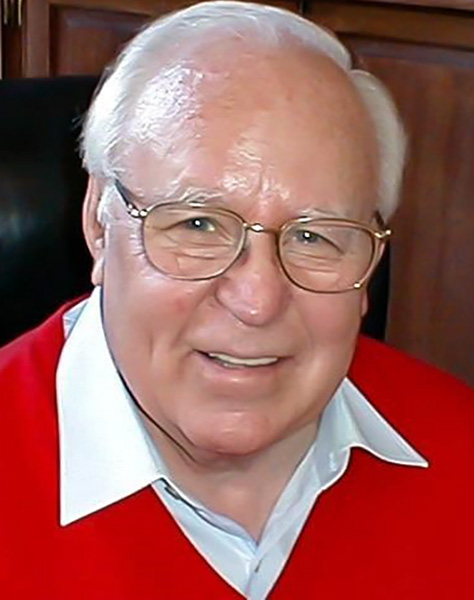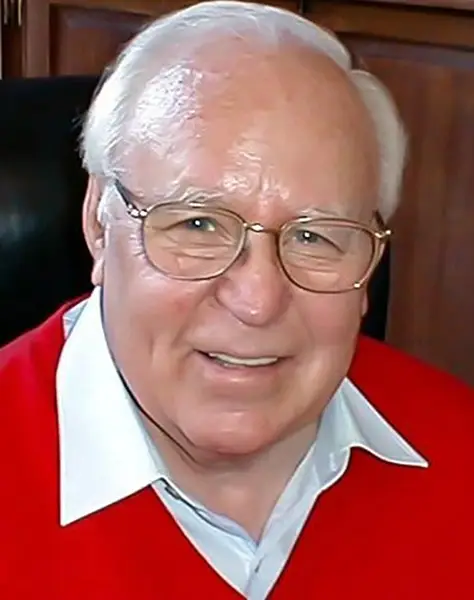FORT WORTH, Texas – William “Dub” Henry Jackson Jr., pioneer of partnership missions, died Jan. 19 in Fort Worth after an extended illness. He was 95.

Recognized as the 1998 distinguished alumnus of the Southwestern Baptist Theological Seminary, Jackson began and ended his life on the campus. He was born there in 1924 while his father was a student, and his last years were spent on Seminary Hill, where he lived and invested in students his passion for missions. He received his bachelor of Divinity degree in 1951 at the Seminary.
A World War II P-38 fighter pilot who saw combat in the Pacific, Jackson would go on to become a missionary to the Japanese people he once fought and to develop a new strategy of missions work – partnership missions, in which laypeople were encouraged to become short-term missionaries rather than only those called to full-time missions.
Southwestern Seminary leaders offered praise of Jackson as news broke that the longtime “Southwesterner” had died.
Southwestern president Adam W. Greenway said, “Dub Jackson was one of God’s choice servants who was mightily used to bring the hope of the gospel not only to his beloved Japan and across Asia, but literally around the world through his work with the now-International Mission Board (IMB) and his launching of what we now take for granted, the concept of ‘partnership missions’ – pairing North American churches with overseas countries in order to mobilize church members for global evangelism. He was a distinguished alumnus of Southwestern Seminary, and spent his final years living here on the campus, encouraging all who came to see him to remain committed to the unfinished task of connecting all people to Jesus Christ. I hope that all my fellow Southwesterners will keep the Jackson family in their thoughts and prayers in this season of grief.”
Former Southern Baptist Convention president Jimmy Draper, who serves today as chairman of the Southwestern Advisory Council, called Jackson “one of the great missionary leaders of the last century.”
John Massey, dean of the Roy J. Fish School of Evangelism and Missions, called Jackson a “treasure of missions experience and evangelistic zeal.” Massey, a former IMB missionary, said Jackson’s “pioneer” work in partnership missions strategy is “deeply entrenched in Southern Baptist missions to this day.”
Professor Mike Morris served as the professor of record for the applied ministry classes Jackson taught students at Southwestern Seminary in his final years.
When Jackson became physically unable to go to the assigned classroom, the classes were held in his home on campus, Morris said.
“He shared personal experiences from his missionary past,” Morris reflected. “He often stressed the importance of evangelism and good cooperation with national Christians in each country.”
Morris, also a former IMB missionary, published an article in the Southwestern Journal of Theology in 2014 noting Jackson’s pioneering missions work.
From the article: “Dub’s most amazing and effective partnership campaign was in April 1963 in which 549 Americans went to Japan, South Korea, Taiwan, the Philippines, Hong Kong, and Singapore at the nationals’ invitation, and they witnessed more than 45,000 people praying to receive the Lord during the six weeks of the campaign. About 25,000 of them were Japanese. Through partnership missions as an FMB [Foreign Mission Board] missionary and as leader of World Evangelism Foundation, Dub led one hundred nationwide campaigns in more than fifty countries with more than 500,000 people praying to receive the Lord.”
Draper, reflecting on the 1963 Texas Baptist Evangelism Conference in which Jackson made the appeal for the Japan New Life Crusade, said Jackson “electrified those who attended. I still tingle just thinking about that night and his remarkable challenge.” For many years, Draper served as board chairman of the World Evangelism Foundation, founded by Jackson after leaving the then-Foreign Mission Board, which resisted the partnership missions strategy.
Draper, who is president emeritus of LifeWay Christian Resources, also served as pastor of First Baptist Church in Euless, Texas, whose members were “transformed” by their participation in missions, he said.
“Southern Baptists in general have never acknowledged the remarkable debt we owe Dub Jackson for his vision and tenacity that literally transformed the attitude and involvement of Southern Baptists churches and individuals toward global missions,” Draper said.
Noting the International Mission Board later embraced partnership missions, Draper added, “I often contemplate what our convention would be like if Dub Jackson had not been God’s chosen vessel to arouse the conscience and compassion of Southern Baptists to the strategic importance of partnership missions.”
In a November 2015 interview with Dub and Doris (who would die less than a month later) the Jacksons reflected on their life of missionary service. The interview was conducted by Keith Eitel, former dean of the Fish School, and is available in the W.H. Dub Jackson Digital Materials Collection in the seminary’s digital archives.
Jackson compared his time in the military to his missions work, saying in each “you have to be ready to go all out. There’s no partial commitment to missions. There’s no partial commitment to combat. You’re either for it or you’re not. You either go all out or you don’t.”
At the end of the war, Jackson was stationed in Japan during the U.S. occupation, where his firsthand observation of the destitute people turned his heart toward reaching them for Christ, although he initially opposed the idea of being a missionary to Japan.
“We were fresh from the jungles, where we were trained to destroy. And I don’t know specifically how the Lord did it, but he sure changed my feeling” toward the Japanese people, he said. Reflecting on an experience with the impoverished people in Tokyo, Jackson recalled during his time in college and seminary the “Lord kept in my mind … to get me back to Japan.”
After the war, Jackson completed his undergraduate degree at Hardin-Simmons University and seminary degree at Southwestern. While a Southwestern student in 1950, he led his first mission trip to Japan and saw some 2,200 Japanese became Christians, he said. That student mission trip was the beginning of what would become known as partnership missions.
“If we can do that, so could somebody else,” he said. “So, we started asking other people to go, telling them what God had done [during the mission trip to Japan]…. And that motivated other people to go, and we didn’t have trouble in those days getting people to go. The Lord impressed them that it was urgent.”
For the last two years, Southwestern Seminary has had a mission partnership with Tokyo International Baptist Church – the church founded by Jackson. Students will take another trip there in May 2020.
Reflecting on the single greatest lesson God taught him in ministry, Jackson said in the 2015 interview, “There’s no place God cannot give the victory. Don’t ever feel like you’ve hit a dead-end wall. God is able to give victory anywhere, anytime we look to Him and ask.”
Jackson’s comments late in life are reminiscent of something he said in a 1954 letter written from Sapporo, Japan, after two years on the field as a missionary.
“[W]e would not choose this pulpit because it could approach any of the good ole Texas Baptist churches, for it cannot as yet do that, but the place where God would have us serve has everything in its favor, if He is there and we will follow. That is our desire.”
In addition to his missionary and pastoral service, Jackson also served at New Orleans Baptist Theological Seminary, Dallas Baptist University and the Baptist World Alliance.
Jackson was preceded in death by Doris, his wife of 68 years; his son William H. (Bill) Jackson III; grandson Jered Jackson; sister May Bond; and brother-in-law, Colonel Vic Lipsesy. He is survived by his children Shirley and Randy Roberts, Lynda and Mike Hughes, David and Darlyne Jackson and Juanita and Steve Hayden; daughter-in-law Susan Jackson; sister Annette Lipsey; 15 grandchildren and 18 great-grandchildren.
Visitation will be held Thursday, Jan. 23, 6-8 p.m. at Laurel Land Funeral Home, 7100 Crowley Road in Fort Worth. The committal service will be Friday, Jan. 24, at 9:15 a.m. at Dallas-Fort Worth National Cemetery. The memorial service will be Jan. 24 at 11:30 a.m. at Laurel Land, with a reception to follow.
Memorial contributions may be made to the Dub and Doris Scholarship Fund at Southwestern Seminary.
Written by Baptist Press, the official news service of the Southern Baptist Convention.

